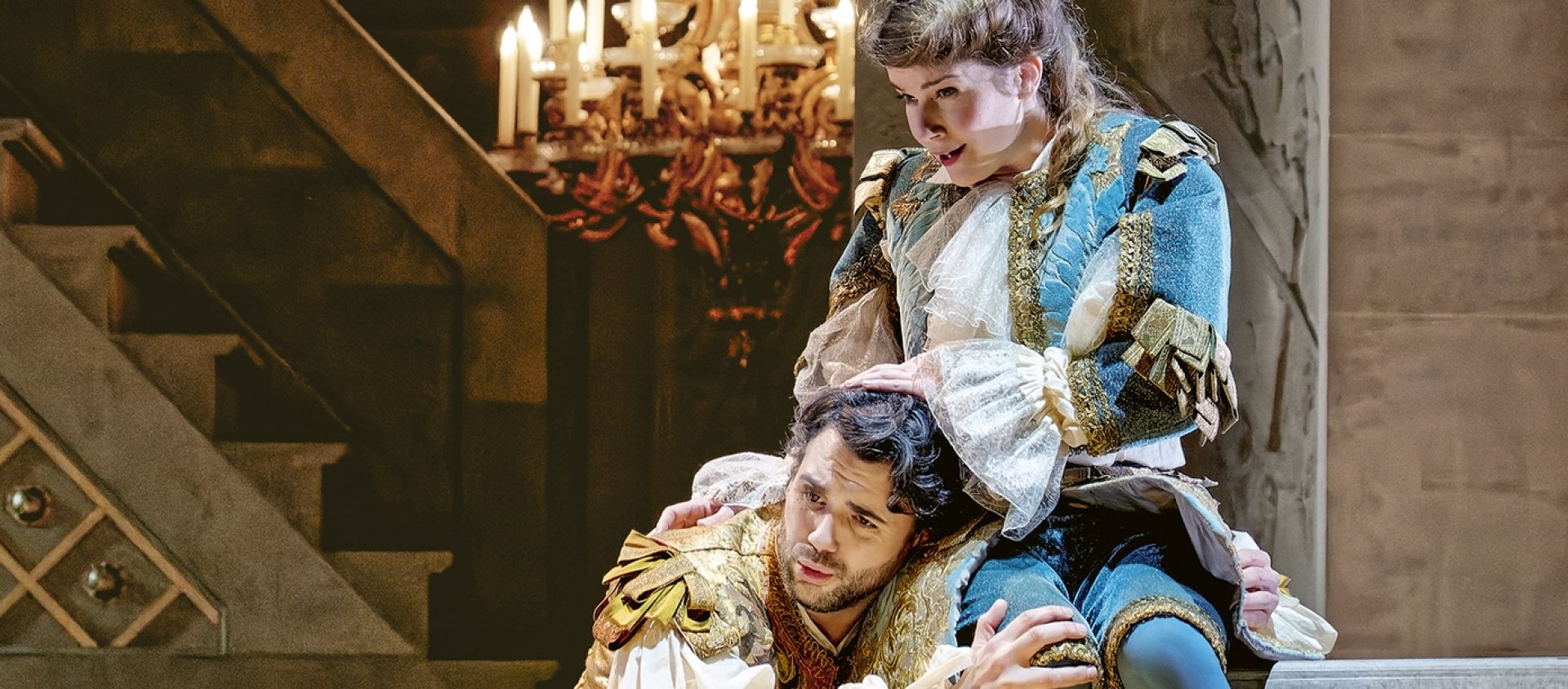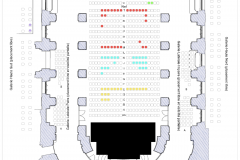Charpentier: David and Jonathas
Mo | Tu | We | Th | Fr | Sa | Su |
Biblical tragedy in five acts with prologue, based on a libretto by Père Bretonneau, first performed in Paris in 1688.
Show in French with French and English surtitles.
Opera in staged version
This is Charpentier’s masterpiece, and one of the miracles of Baroque opera!
Marc-Antoine Charpentier spent most of his career without being able to access opera, as Lully held the royal privilege for this form, however he was able to create a lyrical masterpiece under very special circumstances. In 1688, the Collège Louis Le Grand, in the Jesuit tradition of theatrical, musical and choreographic practice, performed his lyrical tragedy David et Jonathas, with acts interspersed between those of the play Saul. This musical work relates a well-known subject from the Old Testament, the strong friendship – the biblical love – of David and Jonathas, son of King Saul (the latter convinced of the betrayal of the young David, who took refuge in the Philistine’s camp after his banishment). The inevitable confrontation between their armies leads to Saul’s suicide and Jonathas’ death in the arms of the victorious David…
The extraordinary inspiration of Charpentier’s music, the dramatic force of the libretto, and the intense emotion that radiates from the work, led to great success from the outset, as shown by several revivals in other Jesuit colleges. This production is a baroque dream: a performance of the sacred drama David and Jonathas in the Chapelle Royale of Versailles, with a magnificent set by Antoine and Roland Fontaine, costumes by Christian Lacroix, a baroque and vibrant staging by Marshall Pynkoski, choreography by Jeannette Lajeunesse Zingg, and the admirable musical vision of Gaetan Jarry leading exceptional soloists. This is the vibrant version of the fateful, fusional love between David and Jonathas…
Royal Opera Productions / Château de Versailles Spectacles – remake.
Synopsis
Prologue
Saul, King of Israel, visits the "Pythoness" (the Witch of Endor in the Bible) in disguise to learn the outcome of his forthcoming battle against the Philistines. The Pythoness raises the ghost of the prophet Samuel, who predicts that Saul will lose everything: his children, his friends and his crown.
Act 1
David has been banished by the jealous Saul and has taken refuge with the Philistines. He returns to the Philistine camp from a victory. A chorus of warriors, shepherds and captives he has freed sing his praises. David only wishes that, whatever may come, his beloved Jonathas (Saul's son) should be spared. The Philistine king tells David that a truce has been arranged between the Philistines and Saul to discuss whether there shall be peace or war.
Act 2
During the truce, David and Jonathas seek each other out. The Israelite general Joabel is jealous of David and challenges him to single combat, which David refuses. Joabel plots against him and decides to tell Saul that the proposed peace is merely a trick by David.
Act 3
Joabel easily persuades the jealous Saul that David is plotting his downfall. Saul accuses David of treason and he is forced to leave.
Act 4
Saul decides to fight the Philistines and destroy David. The two armies, stirred up by Joabel, are also eager for war. David reluctantly parts from Jonathas, promising he will do all he can to save him and his father.
Act 5
The battle is fought and Saul loses. Jonathas is mortally wounded and dies in David's arms. Saul falls on his own sword to evade capture. Achis tells David he is the new king of the Israelites but this is little consolation in his grief for Jonathas.
Program and cast
VIP CATEGORY: Best seats in house with complimentary glass of champagne and programme.
PRESTIGE CATEGORY: Excellent seats with complimentary glass of champagne and programme.
2h30 with intermission
Reinoud Van Mechelen: David
Caroline Arnaud: Jonathas
David Witczak: Saül
François-Olivier Jean: Pythonisse
Antonin Rondepierre: Joabel
Geoffroy Buffière: Samuel's shadow
Cyril Costanzo: Achis
Chœur et Orchestre: Marguerite Louise
Ballet de l’Opéra Royal
Gaétan Jarry Conductor
Marshall Pinkosky: Director
Jeannette Lajeunesse Zingg: Choreography
Antoine et Roland Fontaine: Stage sets
Christian Lacroix: Costumes
Hervé Gary: Lights
Royal Chapel of Versailles
The Royal Chapel was finished in 1710 at the end of Louis XIV’s reign. Jules Hardouin-Mansart proposed the plan to the King in 1669. The First Architect died in 1708 without seeing the end of the works which were taken over by his brother-in-law Robert De Cotte. The reigning monarch only came for major religious festivals where he received communion, for ceremonies of the Order of Saint-Esprit, for the baptisms and weddings of the royal children celebrated from 1710 to 1789. This exceptional palatine chapel was also used for a wide range of religious ceremonies, including the marriage of Archduchess Marie-Antoinette with the future Louis XVI.
Above the altar, around the organ by Clicquot decorated with a fine relief of King David, played by great masters like François Couperin, the Chapel’s music, famous all over Europe, sung motets everyday during all religious services. Today Handel’s Dixit Dominus or Messiah, Bach’s Oratorios, Magnificat, Cantatas or Passions, Pergolesi’s Stabat Mater or Charpentier’s Te Deum ring out in this majestic architecture.

 EN
EN DE
DE IT
IT FR
FR ES
ES RU
RU JP
JP RO
RO
 Seating plan
Seating plan 